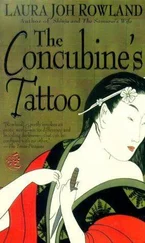The woman put her hands on her hips while her eyes shot angry sparks at Hoshina. “I’m not a liar. And if you think I am, then why were you so excited when I told you who I’d seen with Moriwaki?”
Hoshina spat out a breath of frustration. Amused, Hirata said, “Tell me what you told the police commissioner.”
“A samurai came into the bathhouse with Moriwaki. He begged to talk to him. Moriwaki said he was busy, but the samurai followed him into the dressing room. They started arguing. I didn’t notice what they said, but I think the samurai wanted a favor. Moriwaki told him to leave. He did.”
Hirata sensed that he was on the verge of learning something critical. “Do you know who this samurai was?”
“Yes. I asked Moriwaki, ‘Who was that rude fellow?’ He said it was a Captain Nakai, from the Tokugawa army.” She grinned triumphantly at Hoshina.
He stalked, cursing and furious, out of the room. Now Hirata understood why he’d wanted to keep the proprietress’s information a secret. Captain Nakai was an excellent suspect, who’d demonstrated his martial arts skills during the faction war. Connecting him with Treasury Minister Moriwaki was a stroke of luck, for he hadn’t appeared on the lists of people who’d had contact with any of the previous victims.
“Was Captain Nakai alone with the treasury minister?” Hirata asked.
“Yes. While Moriwaki was undressing.”
“Did he touch Moriwaki?”
“I don’t know. The curtain was closed.”
Hirata was elated nonetheless. When he and the detectives left the bathhouse, he found Police Commissioner Hoshina waiting for him in the street, still fuming.
“I just wanted to tell you that you won’t get away with making a fool of me in there,” Hoshina said. “And if you think you and Chamberlain Sano are going to solve this case and win more honors at my expense, you’re sadly mistaken. I’m going to ruin you both.”
He shoved his hand against Hirata’s chest. Hirata lost his balance; his lame leg buckled. He fell into a pile of horse manure. A cry of indignation burst from him at this public humiliation. Hoshina and his attendants laughed.
“That’s right where you belong,” Hoshina said as the detectives helped Hirata to his feet and wiped the manure off him. “Next time I strike, you’ll stay down.”
Hoshina and his men mounted their horses and rode away. Detective Inoue said, “Don’t pay any attention to that loser, Hirata-san. He’s not worth worrying about.”
But Hirata knew that Hoshina was dangerous as well as desperate to regain his status at court. Their skirmish was only the first round in what promised to be bloody political war. Hirata limped toward his horse. “Come on, we’re going back to Edo Castle. I want to tell Chamberlain Sano about Captain Nakai.” And he’d better warn Sano to expect trouble from his old enemy.
The weather turned warm and muggy as Reiko and her escorts trudged through the hinin settlement. Smoke and sweat filmed her skin; ashes stung her eyes and parched her throat; and she felt as though she was absorbing contamination from the outcasts. Her visits to the first few houses nearest Yugao’s produced no new suspects or witnesses.
“If you want to find the killer, you should look no further than Edo Jail,” the headman said as he and Reiko skirted a garbage heap in an alley.
Reiko had begun to think Kanai was right. The rising temperature increased the stench; she was more than a little tempted to give up. The insolent Yugao hardly seemed worth this effort. But Reiko said, “I’m not finished here yet.”
They circled, through lanes where ragged laundry dripped from clotheslines into overflowing gutters, around to the hovel behind Yugao’s. A yard filled with washtubs, broken tools, and other junk separated the two properties. The outcast who lived in the hovel was an old man who sat in his doorway, fashioning sandals out of scrap straw and twine. When Reiko asked him if he’d seen anyone at Yugao’s house besides her family on the night of the murder, he said, “There was the warden.”
“From Edo Jail?” Reiko said.
The old shoemaker nodded; his gnarled hands deftly plaited the straw. “He was Taruya’s boss.”
“He’s a former gangster,” the headman told Reiko. “He was demoted for extorting money from merchants in the vegetable market and beating them up when they didn’t pay.”
“When did you see him?” Reiko asked, excited because she’d discovered a new suspect, and one with violent tendencies.
“I didn’t see him,” the shoemaker said, “but I heard his voice. He and Taruya were arguing. It was just after sundown.”
“When did he leave?”
“The shouting stopped a little while later. He must have gone.”
Reiko felt a pang of disappointment because the timing of his visit didn’t coincide with the crime. Yet perhaps the warden had returned later to settle his score.
“Where can I find the warden?” Reiko asked.
“Where everybody in this place eventually shows up.” Kanai’s expression indicated that he was losing patience with her, but he said, “Come along; I’ll take you.”
They resumed traipsing through the settlement. Reiko questioned the inhabitants at hovels and passersby they encountered, to no avail. Her escorts looked bored and glum. A water-seller appeared, carrying buckets suspended from a pole on his shoulders, and Reiko longed for a drink but couldn’t bear to swallow water from this filthy place. She dabbed her perspiring face with her sleeve and squinted up at the sun that shone high and bright through the smoke. Against the sky rose the skeletal wooden structure of a fire-watch tower. On the platform under the bell that hung from its top stood a boy.
Reiko called to him, “Excuse me, were you on duty the night the Taruya family was murdered?”
Peering down at her, he nodded.
“Can you come down for a moment and talk?” Reiko said.
He shimmied down the ladder, agile as a monkey. He was perhaps twelve years old, with an elfin face and knobby bones. Reiko asked him to describe what, if anything, he’d observed that night.
“I heard screams,” he said. “I saw Ihei run away from the house.”
“Who is Ihei?” Reiko asked. Interest revived her energy.
“He lives by the river,” said the boy. “He used to visit Umeko.”
“He was a thief in his former existence,” Kanai explained. “Now he’s a street-cleaner.”
Reiko looked up at the tower, gauged its distance from Yugao’s house, and imagined how the settlement must look at midnight. “How did you recognize him?” she asked the boy. “Wasn’t it dark?”
“There was lightning. And Ihei walks like this.” He hunched his back and shuffled.
Reiko didn’t know whether to be glad or sorry that she now had two suspects placed at the crime scene besides Yugao. She thanked the boy, who bowed and darted around her guards.
Kanai shouted, “Wait just a moment!” He ran after the boy and grabbed him by his collar. “Give it back.”
The boy reluctantly took a leather drawstring pouch from his pocket. It was the kind in which men carried money, medicines, religious items, or other small valuables.
“Hey, that’s mine,” Lieutenant Asukai said, groping the empty place where the pouch had once dangled from his sash. He snatched it from the boy’s hand.
“You have to be careful around him, his parents, his brothers, and his sisters,” Kanai said. “Every one of them is a sneak-thief.” He released the boy and swatted his rear end. “Behave yourself, or I’ll have another year added to all your sentences.”
Soon Reiko and her companions reached their destination-a teahouse located in a large shack, enclosed by a thatched roof and plank walls, on the riverbank. Its front and back doors stood open to let the breeze refresh the men who lounged on the raised floor. The proprietor served liquor out of crude ceramic jugs. The teahouse appeared to be the social center of the outcast world. Down the river, boats housed brothels and teahouses for ordinary citizens; bridges led to neighborhoods on the opposite bank.
Читать дальше












